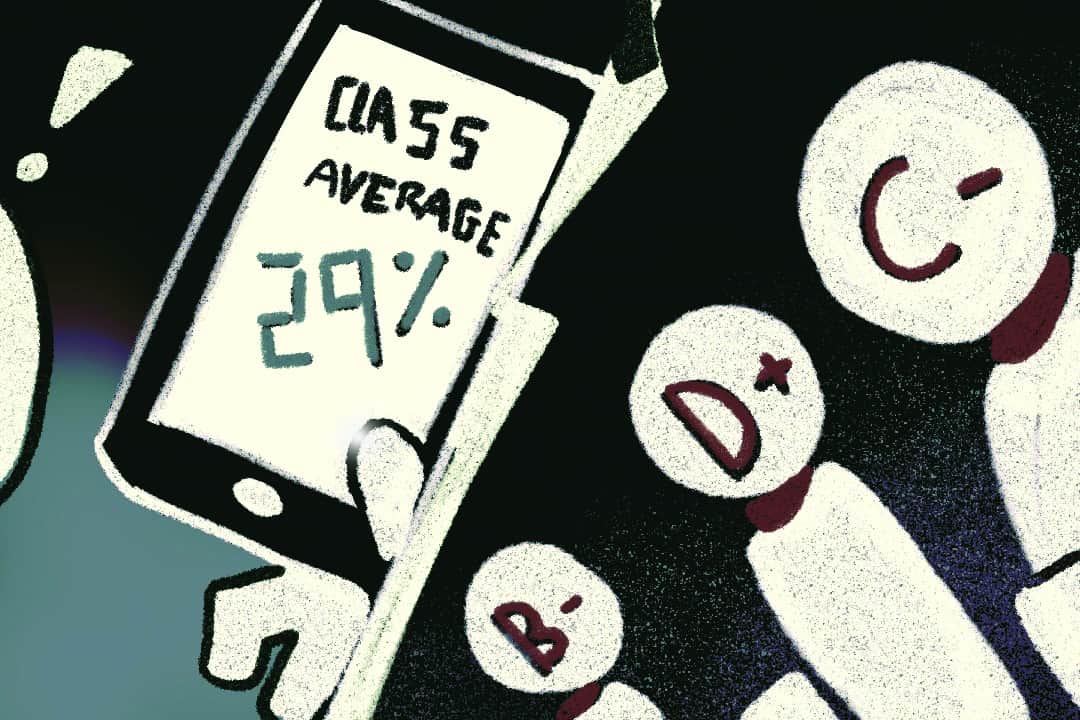The final exam for MAT224 — Linear Algebra II at UTM had an average grade of 29 per cent, sparking discussion about how U of T teaches and assesses students taking math courses.
94 of the 110 students who took the final scored below 50 per cent, and only one student received a mark above 80. When asked for comment, a UTM spokesperson mentioned that 28.4 per cent of students ultimately failed the course, but the majority of those who failed did not sit for the exam. 93 per cent of students who took the exam passed the course.
The Faculty of Arts and Science’s Academic Handbook for Instructors, a manual that provides guidance for instructors in the faculty, advises that, in second year courses, generally no more than 10 per cent of students in a course should fail it, and roughly 15–35 per cent of students should receive a course mark above 80 per cent. However, the UTM Assessment and Grading Practices Policy doesn’t specify guidelines for reasonable grade distributions.
MAT224 is one of two options that students in the UTM math major can choose from for 0.5 of the 2.5 credits the major requires in second year. The half-year course also serves as a prerequisite for seven third-year math courses listed on the UTM academic calendar.
A post about the final’s low average went viral on r/UofT, the university’s page on Reddit, becoming the most upvoted post of the last month and third-most upvoted post of the last year. Many comments blamed the professors and the school for the students’ poor results.
Grades in the null space: Inside the course
Professor Michael Pawliuk, one of the course’s instructors, told The Varsity that, before the final, students’ performance in the course seemed similar to that of previous semesters. He was “quite surprised by the final result.”
He said it was indicative of broader issues at UTM, including pandemic lockdowns impacting students’ prerequisite knowledge and students having less contact with peers for advice and mentorship.
“The sorts of social skills that you develop — being in class, talking to people and having students who are a year ahead of you [or] two years ahead of you that can offer you that guidance and mentorship — those supports weakened during lockdown,” Pawliuk said.
His main advice for students is to use the resources that classes already provide, like office hours, and to attend classes as a default. He also said that he will replace optional quizzes with in-class activities this semester and possibly make bigger changes in the future.
“During the summer, we’ll have more deliberation, thinking about how we want to go forward with this. Was this a blip that just happened, or is this a more major thing that needs to be addressed?”
Razeen Ali, a third-year UTM student majoring in computer science and math, told The Varsity that he liked how the course was run overall but found that finals didn’t accurately test how well students understood the material.
“The profs were great, my friends and I came out of the course feeling like we learnt something and had no problems with the teaching style — just had a problem with how our finals were tested,” he said.
“Someone who only memorized those specific parts [that were tested] but understood nothing else would’ve aced the exam. Either test us to apply our overall understanding or let us know we need to memorize some stuff.”
The MAT224 matrix
Students who have studied before under Pawliuk say that blame doesn’t necessarily lie with the professors teaching the course.
Dylan Galego, a fourth-year computer science student at UTM, took another iteration of MAT224 with Pawliuk in the Winter term of the 2021–2022 academic year and said he had a positive experience.
According to a course-wide email from Pawliuk that the professor forwarded to The Varsity, the MAT224 average for the final was 52.6 per cent in 2021–2022. Galego also didn’t place any blame on professors and instead said that prerequisites that weren’t adequately preparing students, along with a course structure with not enough in-person evaluations, could be to blame.
“When it comes to exams, you have to get it done really quickly [but] you don’t have any practice with that. So I felt like some people might have been initially overconfident or underprepared,” he told The Varsity.
In response, Pawliuk told The Varsity that a large reason that he has assigned take-home assessments throughout the course is to take off the time pressure. “There’s a lot of theory in this course that the computations can be long and tedious so we try to let students show that they can succeed in a non-time pressured situation.”
Other math courses not adding up
One student told The Varsity that this recent exam could be indicative of wider issues in the math department.
Shlomo Alon, a fourth-year computer science (CS) specialist at UTM, used to be in the math department but switched out because of the department’s structure. He noted a lack of practice exams and generally less passion from instructors.
“I learned like 10 times as much over my years in the CS department relative to the math department,” he told The Varsity. “It’s just torture for the sake of torture.”
Overall, Pawliuk said it takes both instructors and students to make courses successful.
“I think of it like a handshake. It’s on us as instructors to put out our hand and to do our part. And it’s also on the students to reach out and to make that connection.”
Editor’s note (February 9): A previous version of this article mistakenly referred to the Academic Handbook for Instructors, which sets recommended grade ranges for professors in the Faculty of Arts and Sciences at UTSG, as a handbook which applies to all U of T faculty. In fact, the recommendations of this handbook do not apply to UTM faculty, and UTM does not have similar specific recommendations.


